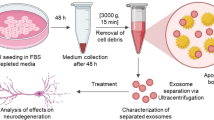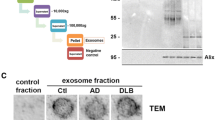Abstract
This study aimed to investigate the neurotoxicity of exosomes to cultured neuroblastoma and neurons in vitro and to mature and newborn neurons in the hippocampus in vivo. Recent in vitro and in vivo studies have shown that exosomes, small membranous vesicles secreted from many cell types, contain pathogenic proteins including full-length amyloid precursor protein (flAPP) and amyloid precursor protein (APP) metabolites. However, the function of these exosomes in Alzheimer disease (AD) has not been much explored. In the present study, exosomes were harvested from the conditioned medium of HEK293-APP Swe/Ind cells and injected into the hippocampal dentate gyrus region via a stereotactic method to detect their effects on the neuronal survival in vivo. These exosomes containing pathogenic proteins showed high neurotoxicity and could impair neurogenesis in the hippocampus. The data demonstrated that exosomes secreted from sick cells might damage neurogenesis and promote disease progression in AD.





Similar content being viewed by others
Abbreviations
- FlAPP:
-
Full-length amyloid precursor protein
- DG:
-
Hippocampal dentate gyrus
- CTFs:
-
C-terminal fragments
- MVBs:
-
Multivesicular bodies
- NDEs:
-
Neuronal derived exosomes
- TEM:
-
Transmission electron microscope
- NTA:
-
Nanoparticle tracking analysis
- DCX:
-
Doublecortin
- APP-EXO:
-
Exosomes harvested from HEK cells expressing APP Swe/Ind
- EXO:
-
Exosomes harvested from HEK cells transfected with null vector
References
Bond AM, Ming GL, Song H (2015) Adult mammalian neural stem cells and neurogenesis. Five Decades Later Cell stem cell 17:385–395. doi:10.1016/j.stem.2015.09.003
Christian KM, Song H, Ming GL (2014) Functions and dysfunctions of adult hippocampal neurogenesis. Annu Rev Neurosci 37:243–262. doi:10.1146/annurev-neuro-071013-014134
Chuang TT (2010) Neurogenesis in mouse models of Alzheimer's disease. Biochim Biophys Acta 1802:872–880. doi:10.1016/j.bbadis.2009.12.008
Coleman BM, Hill AF (2015) Extracellular vesicles—their role in the packaging and spread of misfolded proteins associated with neurodegenerative diseases. Semin Cell Dev Biol 40:89–96. doi:10.1016/j.semcdb.2015.02.007
Deng W, Aimone JB, Gage FH (2010) New neurons and new memories: how does adult hippocampal neurogenesis affect learning and memory? Nat Rev Neurosci 11:339–350. doi:10.1038/nrn2822
Donovan MH, Yazdani U, Norris RD, Games D, German DC, Eisch AJ (2006) Decreased adult hippocampal neurogenesis in the PDAPP mouse model of Alzheimer's disease. J Comp Neurol 495:70–83. doi:10.1002/cne.20840
Dreyer F, Baur A (2016) Biogenesis and functions of exosomes and extracellular vesicles. Methods Mol Biol 1448:201–216. doi:10.1007/978-1-4939-3753-0_15
Ge S, Yang CH, Hsu KS, Ming GL, Song H (2007) A critical period for enhanced synaptic plasticity in newly generated neurons of the adult brain. Neuron 54:559–566. doi:10.1016/j.neuron.2007.05.002
Guo BB, Bellingham SA, Hill AF (2016) Stimulating the release of exosomes increases the intercellular transfer of prions. J Biol Chem 291:5128–5137. doi:10.1074/jbc.M115.684258
Haughey NJ, Nath A, Chan SL, Borchard AC, Rao MS, Mattson MP (2002) Disruption of neurogenesis by amyloid beta-peptide, and perturbed neural progenitor cell homeostasis, in models of Alzheimer's disease. J Neurochem 83:1509–1524
Hock C et al (1998) Cerebrospinal fluid levels of amyloid precursor protein and amyloid beta-peptide in Alzheimer's disease and major depression - inverse correlation with dementia severity. Eur Neurol 39:111–118
Joshi P et al (2014) Microglia convert aggregated amyloid-beta into neurotoxic forms through the shedding of microvesicles. Cell Death Differ 21:582–593. doi:10.1038/cdd.2013.180
Kokubo H, Saido TC, Iwata N, Helms JB, Shinohara R, Yamaguchi H (2005) Part of membrane-bound Abeta exists in rafts within senile plaques in Tg2576 mouse brain. Neurobiol Aging 26:409–418. doi:10.1016/j.neurobiolaging.2004.04.008
Lledo PM, Alonso M, Grubb MS (2006) Adult neurogenesis and functional plasticity in neuronal circuits. Nat Rev Neurosci 7:179–193. doi:10.1038/nrn1867
Morgenstern NA, Giacomini D, Lombardi G, Castano EM, Schinder AF (2013) Delayed dendritic development in newly generated dentate granule cells by cell-autonomous expression of the amyloid precursor protein. Mol Cell Neurosci 56:298–306. doi:10.1016/j.mcn.2013.07.003
Pan H et al (2016) Amyloid beta is not the major factor accounting for impaired adult hippocampal neurogenesis in mice overexpressing amyloid precursor protein. Stem cell reports 7:707–718. doi:10.1016/j.stemcr.2016.08.019
Perez-Gonzalez R, Gauthier SA, Kumar A, Levy E (2012) The exosome secretory pathway transports amyloid precursor protein carboxyl-terminal fragments from the cell into the brain extracellular space. J Biol Chem 287:43108–43115. doi:10.1074/jbc.M112.404467
Podlisny MB, Mammen AL, Schlossmacher MG, Palmert MR, Younkin SG, Selkoe DJ (1990) Detection of soluble forms of the beta-amyloid precursor protein in human plasma. Biochem Biophys Res Commun 167:1094–1101
Rajendran L, Honsho M, Zahn TR, Keller P, Geiger KD, Verkade P, Simons K (2006) Alzheimer's disease beta-amyloid peptides are released in association with exosomes. Proc Natl Acad Sci U S A 103:11172–11177. doi:10.1073/pnas.0603838103
Sastre M et al (2001) Presenilin-dependent gamma-secretase processing of beta-amyloid precursor protein at a site corresponding to the S3 cleavage of Notch. EMBO Rep 2:835–841. doi:10.1093/embo-reports/kve180
Schneider A, Simons M (2013) Exosomes: vesicular carriers for intercellular communication in neurodegenerative disorders. Cell Tissue Res 352:33–47. doi:10.1007/s00441-012-1428-2
Sharples RA et al (2008) Inhibition of gamma-secretase causes increased secretion of amyloid precursor protein C-terminal fragments in association with exosomes. FASEB journal: official publication of the Federation of American Societies for Experimental Biology 22:1469–1478. doi:10.1096/fj.07-9357com
Simpson RJ, Jensen SS, Lim JW (2008) Proteomic profiling of exosomes: current perspectives. Proteomics 8:4083–4099. doi:10.1002/pmic.200800109
Smalheiser NR (2007) Exosomal transfer of proteins and RNAs at synapses in the nervous system. Biol Direct 2:35. doi:10.1186/1745-6150-2-35
Suh YH, Checler F (2002) Amyloid precursor protein, presenilins, and alpha-synuclein: molecular pathogenesis and pharmacological applications in Alzheimer's disease. Pharmacol Rev 54:469–525
Tasaki M et al (2010) Transmission of circulating cell-free AA amyloid oligomers in exosomes vectors via a prion-like mechanism. Biochem Biophys Res Commun 400:559–562. doi:10.1016/j.bbrc.2010.08.101
Thery C (2011) Exosomes: secreted vesicles and intercellular communications F1000. Biology Reports 3:15. doi:10.3410/B3-15
Thery C, Amigorena S, Raposo G, Clayton A (2006) Isolation and characterization of exosomes from cell culture supernatants and biological fluids. Current protocols in cell biology. Chapter 3: Unit 3 22 doi:10.1002/0471143030.cb0322s30
Van Nostrand WE et al (1992) Decreased levels of soluble amyloid beta-protein precursor in cerebrospinal fluid of live Alzheimer disease patients. Proc Natl Acad Sci U S A 89:2551–2555
Vella LJ, Sharples RA, Lawson VA, Masters CL, Cappai R, Hill AF (2007) Packaging of prions into exosomes is associated with a novel pathway of PrP processing. J Pathol 211:582–590. doi:10.1002/path.2145
Vetrivel KS, Thinakaran G (2006) Amyloidogenic processing of beta-amyloid precursor protein in intracellular compartments. Neurology 66:S69–S73. doi:10.1212/01.wnl.0000192107.17175.39
Vingtdeux V et al (2007) Alkalizing drugs induce accumulation of amyloid precursor protein by-products in luminal vesicles of multivesicular bodies. J Biol Chem 282:18197–18205. doi:10.1074/jbc.M609475200
Wang G et al (2012) Astrocytes secrete exosomes enriched with proapoptotic ceramide and prostate apoptosis response 4 (PAR-4): potential mechanism of apoptosis induction in Alzheimer disease (AD). J Biol Chem 287:21384–21395. doi:10.1074/jbc.M112.340513
Winston CN et al. (2016) Prediction of conversion from mild cognitive impairment to dementia with neuronally derived blood exosome protein profile Alzheimer's & dementia. 3:63–72 doi:10.1016/j.dadm.2016.04.001
Yamazaki T, Koo EH, Selkoe DJ (1996) Trafficking of cell-surface amyloid beta-protein precursor. II. Endocytosis, recycling and lysosomal targeting detected by immunolocalization. J Cell Sci 109(Pt 5):999–1008
Yetman MJ, Jankowsky JL (2013) Wild-type neural progenitors divide and differentiate normally in an amyloid-rich environment. The Journal of neuroscience: the official journal of the Society for Neuroscience 33:17335–17341. doi:10.1523/JNEUROSCI.1917-13.2013
Young-Pearse TL, Bai J, Chang R, Zheng JB, LoTurco JJ, Selkoe DJ (2007) A critical function for beta-amyloid precursor protein in neuronal migration revealed by in utero RNA interference. The Journal of neuroscience: the official journal of the Society for Neuroscience 27:14459–14469. doi:10.1523/JNEUROSCI.4701-07.2007
Zhang N et al (2017) Multiple target of hAmylin on rat primary hippocampal neurons. Neuropharmacology 113:241–251. doi:10.1016/j.neuropharm.2016.07.008
Acknowledgements
We thank Edward Koo for CT15 antibody and Dennis Selkoe and Tracy Young-Pearse for pCAX APP Swe/Ind. This work was supported by grants from the National 973 Project (grant numbers 2013CB530900 and 2013CB530904), the National Nature Science Foundation of China (grant numbers 81400866 and 81400933), and the Nature Science Foundation of Zhejiang Province(LY17H090005). They also thank the Institute of Key Laboratory of Neurobiology of Zhejiang Province, Zhejiang University School of Medicine, China, for institutional support.
Author information
Authors and Affiliations
Corresponding authors
Ethics declarations
Competing Interests
The authors declare no competing financial interests.
Rights and permissions
About this article
Cite this article
Zheng, T., Pu, J., Chen, Y. et al. Exosomes Secreted from HEK293-APP Swe/Ind Cells Impair the Hippocampal Neurogenesis. Neurotox Res 32, 82–93 (2017). https://doi.org/10.1007/s12640-017-9713-1
Received:
Revised:
Accepted:
Published:
Issue Date:
DOI: https://doi.org/10.1007/s12640-017-9713-1




